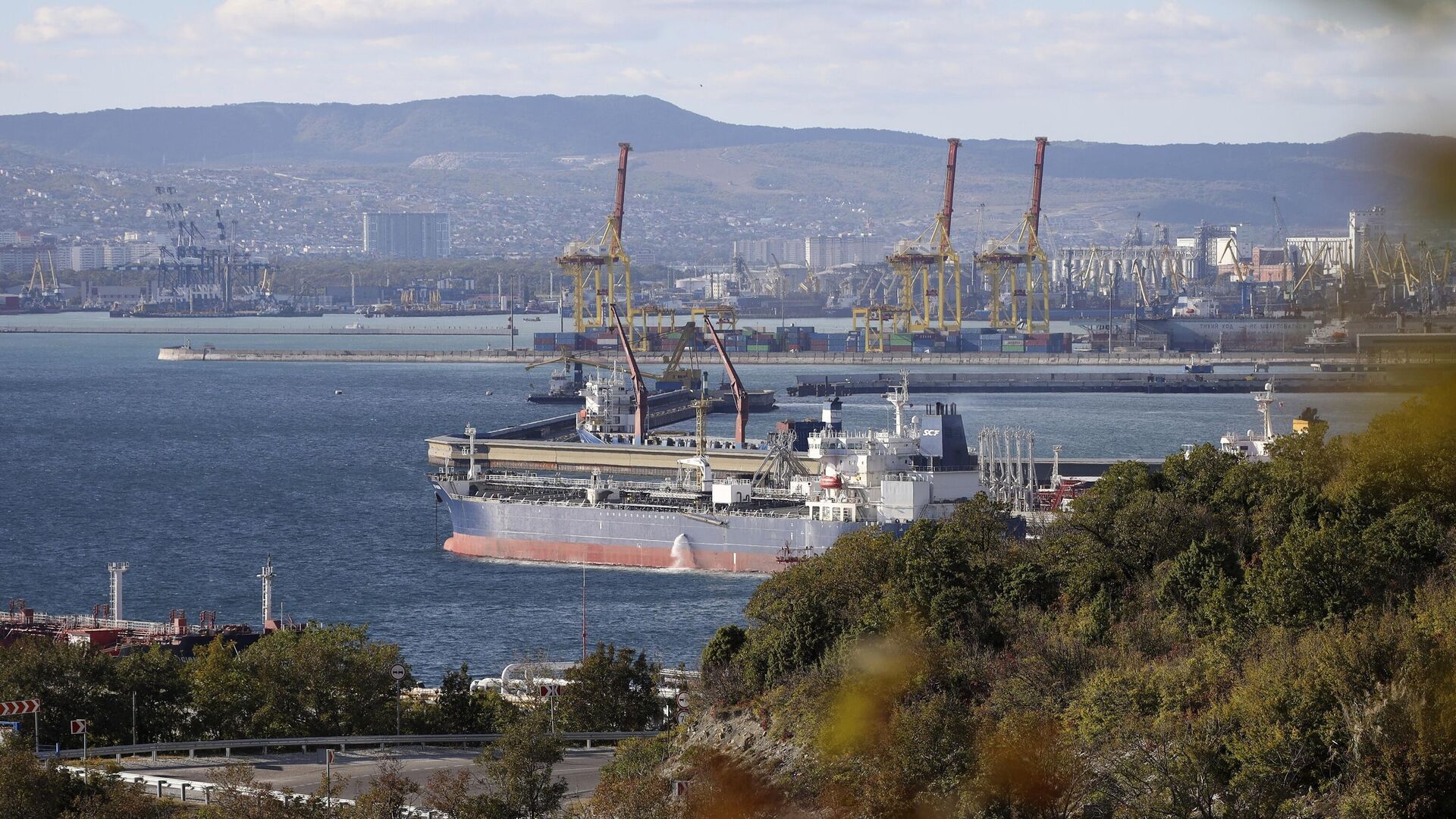https://sputniknews.in/20240524/oil-sanctions-have-played-bad-joke-on-the-west-7445155.html
Oil Sanctions Have Played Bad Joke On the West
Oil Sanctions Have Played Bad Joke On the West
Sputnik India
Western nations imposed unilateral sanctions on Russia in February 2022 after the Eurasian nation launched its Special Military Operation (SMO) in Ukraine to de-Nazify the eastern European state.
2024-05-24T20:42+0530
2024-05-24T20:42+0530
2024-05-28T19:13+0530
sputnik opinion
india
russia
moscow
european union (eu)
opec+
russian oil
russian oil price cap
https://cdn1.img.sputniknews.in/img/07e8/03/1a/6945108_0:160:3072:1888_1920x0_80_0_0_ae162a094454aa177e4ebeedd91e3af4.jpg
Supplies of Russian oil to India hit a nine-month high in April, according to Reuters.The report said that Indian refiners bought 1.8 million barrels per day (bpd) of Russian crude last month, marking an 8.2 percent jump in the South Asian nation's shipments from its long-time strategic partner in March.Big Jump in Russian Crude's Share in India's Oil BasketThe significant rise in shipments of crude took Russia's share in India's oil basket to 38 percent from 32 percent in the previous month.Though India's oil imports from Russia have remained robust for over two years, Western media outlets have predicted that oil purchases from Moscow will fall, almost every month.Arpit Chandna, an energy specialist at London Stock Exchange Group (LSEG) company Refinitiv, explained that it was well known that during any unrest in the Middle East, crude oil from Russia rises in price due to uncertainty in supplies coming from other oil-rich regions.Western Sanctions Can't Hold Off Russian Crude ExportsChandna believes that lack of excess crude oil storage in Russia will result in more exports in coming weeks. That is likely to dent the commitment of the OPEC+ production agreement to cut exports in the first quarter of 2024, he stressed.India has repeatedly stated that Russian oil is one of the main contributors to fuelling its economy. But the West continues to put pressure on New Delhi to sever its time-tested relations with Moscow — which looks like an attempt to create friction between India and Russia over oil supplies.However, trade relations between the two countries remain strong and mutually supportive, Chandna argued.Since February 2002 European states have switched from Russia to Middle Eastern oil exporters — who were previously India's main suppliers. India has consequently turned to Russia to avoid paying higher prices for crude in competition with Europe.Europe's Bluff CalledDespite EU and G7 ban in Dec 2022, oil exports from Russia are not limited to pipeline supplies, Chandna revealed. He mentioned that the crude shipments are coming by sea to Bulgaria and via pipeline to the Czech Republic, Slovakia and Hungary.By comparison, China bought nearly 53 percent of Russia's crude exports, followed by India (32 percent), the EU (7 percent) and Turkiye (5 percent) since December 2022, the commodities trader highlighted.India has more than 85 percent dependency on imports for its crude oil needs, making its economy price-sensitive. While Russian price discounts are shrinking, the higher import volume availability is leading to significant savings for buyers like India, the expert concluded.
https://sputniknews.in/20240518/imperial-facetiousness--us-says-it-allowed-india-to-purchase-russian-oil-7395920.html
india
russia
moscow
Sputnik India
feedback.hindi@sputniknews.com
+74956456601
MIA „Rossiya Segodnya“
2024
Pawan Atri
https://cdn1.img.sputniknews.in/img/07e6/0c/13/139630_147:0:831:684_100x100_80_0_0_8fa2b25903e7787fe6a2698552c167df.png
Pawan Atri
https://cdn1.img.sputniknews.in/img/07e6/0c/13/139630_147:0:831:684_100x100_80_0_0_8fa2b25903e7787fe6a2698552c167df.png
News
en_IN
Sputnik India
feedback.hindi@sputniknews.com
+74956456601
MIA „Rossiya Segodnya“
Sputnik India
feedback.hindi@sputniknews.com
+74956456601
MIA „Rossiya Segodnya“
Pawan Atri
https://cdn1.img.sputniknews.in/img/07e6/0c/13/139630_147:0:831:684_100x100_80_0_0_8fa2b25903e7787fe6a2698552c167df.png
russian oil exports, russian oil exports to india, india crude imports, india energy imports, russian crude, us sanctions on russia, g7 price cap, g7 price cap on russian oil, western sanctions on russia, us sanctions on russia, russia india ties, russia india relations,
russian oil exports, russian oil exports to india, india crude imports, india energy imports, russian crude, us sanctions on russia, g7 price cap, g7 price cap on russian oil, western sanctions on russia, us sanctions on russia, russia india ties, russia india relations,
Oil Sanctions Have Played Bad Joke On the West
20:42 24.05.2024 (Updated: 19:13 28.05.2024) Western nations imposed unilateral sanctions on Russia in February 2022 after the Eurasian nation launched its Special Military Operation (SMO) in Ukraine to de-Nazify the eastern European state.
Supplies of Russian oil to India hit a nine-month high in April, according to Reuters.
The report said that Indian refiners bought 1.8 million barrels per day (bpd) of Russian crude last month, marking an 8.2 percent jump in the South Asian nation's shipments from its long-time strategic partner in March.
Big Jump in Russian Crude's Share in India's Oil Basket
The significant rise in shipments of crude took Russia's share in India's oil basket to 38 percent from 32 percent in the previous month.
Though India's oil imports from Russia have remained robust for over two years, Western media outlets have
predicted that oil purchases from Moscow will fall, almost every month.
Arpit Chandna, an energy specialist at London Stock Exchange Group (LSEG) company Refinitiv, explained that it was well known that during any unrest in the Middle East, crude oil from Russia rises in price due to uncertainty in supplies coming from other oil-rich regions.
"In the recent turmoil witnessed in Europe and the Middle East, the prices are running beyond fundamentals," Chandna told Sputnik India on Thursday.
Western Sanctions Can't Hold Off Russian Crude Exports
Chandna believes that lack of excess crude oil storage in Russia will result in more exports in coming weeks. That is likely to dent the commitment of the OPEC+ production agreement to cut exports in the first quarter of 2024, he stressed.
"The Western embargo on Russian oil cannot hold off the Russian crude flow in the global supply chain, which is clearly visible as per trade flow data and the Russian oil trade revenue figures reported in the latest CREA reports," the analyst added.
India has repeatedly stated that Russian oil is one of the main contributors to fuelling its economy. But the West continues to put pressure on New Delhi to sever
its time-tested relations with Moscow — which looks like an attempt to create friction between India and Russia over oil supplies.
However, trade relations between the two countries remain strong and mutually supportive, Chandna argued.
"Indian refiners are still avoiding tankers explicitly sanctioned by the US and its allies, but are importing oil on a delivered basis — which implies that the shipping and insurance for the cargoes rests with the Russian suppliers, not with Indian buyers," he pointed out.
Since February 2002 European states have switched from Russia to Middle Eastern oil exporters — who were previously India's main suppliers. India has consequently turned to Russia to avoid paying higher prices for crude in competition with Europe.
Despite EU and G7 ban in Dec 2022, oil exports from Russia are not limited to pipeline supplies, Chandna revealed. He mentioned that the crude shipments
are coming by sea to Bulgaria and via pipeline to the Czech Republic, Slovakia and Hungary.
By comparison, China bought nearly 53 percent of Russia's crude exports, followed by India (32 percent), the EU (7 percent) and Turkiye (5 percent) since December 2022, the commodities trader highlighted.
"India has maintained its individual stance of buying crude oil from cheaper and viable sources, which for them is Russia followed by Iraq and Saudi Arabia — who used to be the traditional suppliers to the country," Chandna stated.
India has more than 85 percent dependency on imports for its crude oil needs, making its economy price-sensitive. While Russian price discounts are shrinking, the higher import volume availability is leading to significant savings for buyers like India, the expert concluded.



